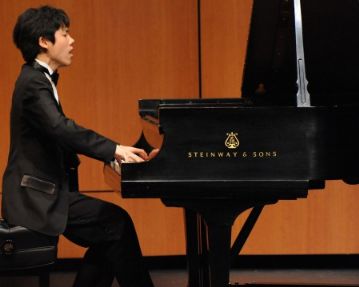|
Recital
ELEGANT VOCAL MASTERY AT ROSES SIGNATURE RECITAL
by Pamela Hicks Gailey
Sunday, February 25, 2024
Recital
DEMANDING SCHUMANN WORK IN MUSIC AT OAKMONT RECITAL
by Terry McNeill
Thursday, November 9, 2023
Recital
RARE RAVEL IN MENDO FESTIVAL'S PRESTON HALL
by Terry McNeill
Thursday, July 20, 2023
Recital
FRENCH FLAVOR IN RARE FOUR-HAND RECITAL
by Judy Walker
Sunday, January 15, 2023
Recital
ASSERTIVE PIANISM IN YAKUSHEV'S OCCIDENTAL RECITAL
by Terry McNeill
Sunday, November 13, 2022
Recital
HEROIC LIM PERFORMANCE AT STEINWAY SOCIETY RECITAL
by Abby Wasserman
Sunday, September 18, 2022
Recital
AGGRESSIVE PIANISM IN MYER'S MENDO FESTIVAL RECITAL
by Terry McNeill
Thursday, July 14, 2022
Recital
UNIQUE ELEGANCE IN GALBRAITH GUITAR RECITAL
by Gary Digman
Friday, April 29, 2022
Recital
ALLURING GLASS WORKS IN WEILL RECITAL
by Terry McNeill
Friday, March 25, 2022
Recital
FORGOTTEN BACH SHINES IN YARDEN'S OAKMONT RECITAL
by Terry McNeill
Thursday, March 10, 2022
|
 |
 Pianist Hauchen Zhang |
SLAM BANG SONORITY IN HAOCHEN ZHANG'S SCHROEDER RECITAL
by Terry McNeill
Sunday, March 19, 2017
Piano Competition winners are in ample supply, and it’s often a hit and miss proposition as to their sterling interpretative qualities. However, the quadrennial Van Cliburn Competition in Ft. Worth has continually produced top-level artists, and the 2009 winner Haochen Zhang proved a formidable performer in his March 19 recital in Schroeder Hall.
The pianist began a demanding concert with two big Schumann works of opposite emotional content. The Op. 15 Kinderszenen came first and received a performance that stuck closely to the programmatic connotations of the 14 individual pieces. Longer than expected ritards and taking all of the repeats underscored sober and carefully crafted playing, and sometime Mr. Zhang paused between sections, and sometime with pedal he connected them. The slow ending of Träumerei was enchanting.
It was the best local performance of Kinderszenen since Valentina Lisitsa’s traversal seven years ago in the Concerts Grand series.
The recital’s finest playing came with the Symphonic Etudes, Op.13, written in 1834 and played here without the whole additional set of five posthumous variations. Mr. Zhang did surprisingly insert the C-Sharp Minor Variation (of the five) between Etudes 2 and 3, and etherial D-Flat Major later, and and played both beautifully. He commanded in the Schumann a formidable octave and staccato chord technique, and overlapped phrases with the damper pedal, occasionally holding back at the end of slow phrases.
In the penultimate variation (andante espressivo) he used left hand pedal point notes and produced a lovely vocal quality (tenor?) singing line, and in the lengthy final D Flat variation he played the two repeats. Here he pushed the tempo and piano volume to the instrument’s limits, but clearly Mr. Zhang sees the Etudes as a brawny work. The applause from the 110 in Schroeder was fulsome.
In the second half the artist sharply changed the program, dropping the ultra Romantic Liszt Harmonies du Soir and the Bartok Sonata, and instead of a Janacek work he began with two of Liszt’s Etudes Transcendals – Feux Follet (Will of the Wisp) and Chasse Neige (Snow Storm). Both received virtuoso performances, and Mr. Zhang seemed happiest with music that required lots of exceptional finger technique. Fast cross-hand double note playing characterized the first, and in the second he built a ferocious storm of volume with left-hand tremolos and impressive endurance.
Relief from the storms came with Janacek’s In the Mists, a four-movement 1912 work where Mr. Zhang produced veiled floating chords and subtle control of pianissimo. In the andantino the playing of the simple repeated theme was elegant. The music was enveloping melancholy.
Ginastera’s iconic First Sonata closed the program, a work from 1952 that expands on the insistent design of the Danzas Argentinas composed 15 years earlier. Mr. Zhang owns the piece, and gave it his expected roaring motor excitement. He brought out the jazz riffs and his double octaves spread way apart were thunderous and accurate, or at least they probably were in the sonic din of the final percussive toccata. Through all this ostinato playing the rhapsodic adagio was almost bucolic. I have not heard louder piano playing in Schroeder than the pianist produced in the Ginastera.
A standing ovation recalled the artist, and the solo encore was the Arkady Volodos transcription of Mozart’s K. 331 Rondo (“Alla Turca”). The transcription is a virtuoso stunt, and recalled Lang Lang’s encore carving of Chopin’s “Minute Waltz” at the Weill Hall inaugural concert. At that recital the Classical Sonoma reviewer wrote of the encore being “deliciously tasteless.” Here the bombast wasn’t tasteful at all.
Lee Ormasa and Gerald Blodgett contributed to this review.
|

